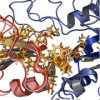Today University of Washington researchers scored a triumph in the ongoing battle for domination of the planet by demonstrating that sometimes humans are better at video games. The announcement came from David Baker, a biologist at the Howard Hughes Medical Institute, and Zoran Popovic and Seth Cooper, computer scientists at the University of Washington.
Their efforts, which were published in the journal Nature today, were part of a two year old project designed to apply brainpower from computer games to complex medical problems. One such problem was the idea of folding proteins. While scientists know the components of proteins, they have had difficulty figuring out how those components fit together. In the multiplayer online game Foldit , players demonstrated more ability to solve the problem using radical moves, risk-taking, and an ability to see the long-term picture.
Players working collaboratively develop a rich assortment of new strategies and algorithms; unlike computational approaches, they explore not only the conformational space but also the space of possible search strategies. The integration of human visual problem-solving and strategy development capabilities with traditional computational algorithms through interactive multiplayer games is a powerful new approach to solving computationally-limited scientific problems.
FoldIt was inspired by the MMORPG World of Warcraft as well as less complex online games. It's an exercise in crowdsourcing - bringinh a group's collective intelligence to bear on a specific problem or topic. Players are given a protein which they must twist and tug in order to move it to its lowest energy state. The lower the energy state, the higher the player's score. Players can compete individually or as part of a team while chatting online about the game.
The paper lists the longest set of acknowledgements in a scientific paper by including the over 57,000 humans who played FoldIt. Many FoldIt players were non-scientists; the top five solo players all had no more than a high school-level background in chemistry. Nonetheless, such players outperformed Rosetta, a program designed to predict protein structures.
[youtube]va92d9Ei1QM[/youtube]

